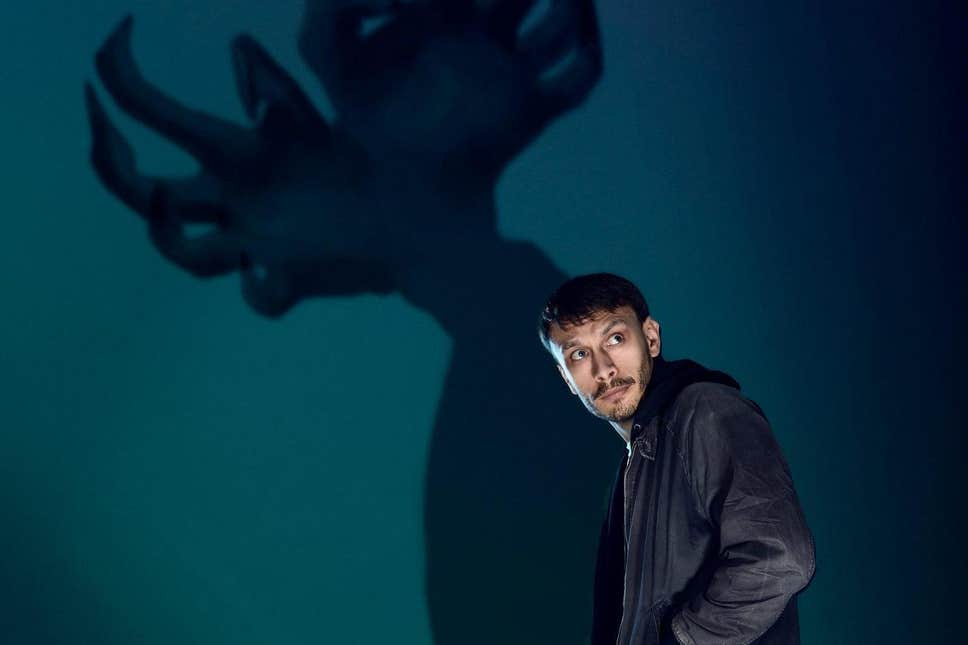It’s no surprise that Richard Gadd, a man who won the Edinburgh Comedy Award with the most dramatic and theatrical of comedy routines, can step into Summerhall’s Roundabout and own it. He’s a commanding performer, with the timing of a comic, the flow of a spoken word artist, and the physicality of a silent actor. He also has, in Baby Reindeer, a show for our times – personal, explicit, purportedly unfiltered, and full of conflicts of gender and sexuality. In short, it is tailor made for Edinburgh 2019.
But with that comes a focus on the self which, the way it is done here, can leave you conflicted as an audience member.
For those who saw his award winner, Monkey See, Monkey Do, in which Gadd revealed his assault by a man in the industry and the crisis of sexuality that accompanied it, Baby Reindeer provides further context. It’s less a sequel than a parallel story, and one that Gadd has chosen to tackle from the theatre rather than the comedy side of his oeuvre. Unbeknown to us, at the same time that he was dealing with the issues revealed in Monkey See… he was dealing with a stalker – a middle-aged Northern Irish woman called Martha. He met her in the pub in which he worked; in his words he ‘felt sorry for her’ and let her have free drinks. Over time, to the amusement of his co-workers, she developed an attachment to him, began sending explicit messages and became aggressive when he didn’t return her affection. Things escalated, and by the time he won his award, the police were involved.
This is all played out in storytelling format, with Gadd using a bar chair as the main prop, and calling on audio recordings from others in the story. It plays out over modern media too, with text messages and Facebook posts beamed onto the Roundabout roof for context. Gadd smoothly switches modes as the story progresses. He plays laddy barman in the build-up, vulnerable artiste when he’s addressing us, but what is mainly projected from the revolving mini-stage is anger, resentment and hostility to Martha, whose voice is heavily curated.
There’s an issue with this framing. His award-winner played out in his head; it was his own struggle with himself. But there are other characters in this one and by rights, they need filling out, particularly so in the case of Martha. We get bare and brutal physical description (‘rotund’), an insight into the yarns she spun (she was supposedly a lawyer, yet couldn’t afford a drink) and, reading between the lines, some genuine facts. But Gadd says at one point he knew her so well he could write her biography. If that is true, he doesn’t show it here. She is reduced to A Mentally Ill Woman in service of Gadd’s personal story, and not allowed any motivation of her own, or mitigation for her actions (at least until the very end). Martha exists as Offender. Voices on recordings are reduced to roles too – mother, father, landlady. The effect is clinical.
The context doesn’t help either. Gadd flashes up a video of him collecting his Comedy Award and reveals the difficulties he was going through with Martha at the same time. It’s done to ramp up drama – at the pinnacle of his life’s ambitions, he’s in the middle of this maelstrom – but it also serves to alienate. He is Comedian Richard Gadd and this is His Story. There’s very little of the universal for us to pick up on. We’re led very directly and specifically, Gadd leaving no room for audiences to draw their own conclusions.
You can’t disbelieve him, of course. This is a man opening up about personal trauma, and in part, there’s a theme here about the police not taking male-on-female stalking seriously. But you can feel cynically manipulated. As both victim and storyteller, Gadd has you over a barrel. The pub scenario he portrays seems toxic and cruel, full of graphic sexual come-ons and mockery that verges on misogyny, but since he is ultimately the victim, we are not permitted to challenge his conduct. Nor are we permitted to feel sympathy for this woman, the stalker, even though by the sounds of things, she’s deeply troubled and vulnerable. Briefly, he speaks of the guilt he felt at having led her on, allowing just enough of a hint of his own complicity, but then snatches it away. Then at the very end, when the origins of the title are finally made clear, Gadd invites some sympathy and understanding for the woman in question – but that’s undercut by the incurious and dismissive approach he’s taken up till then.
Gadd is in every way at the centre of this piece. In terms of performance, that’s a good thing. In terms of the story, less so. Having our interpretations shepherded so tightly makes Baby Reindeer a frustrating watch, albeit a compelling one from a man whose star remains in the ascendant.
